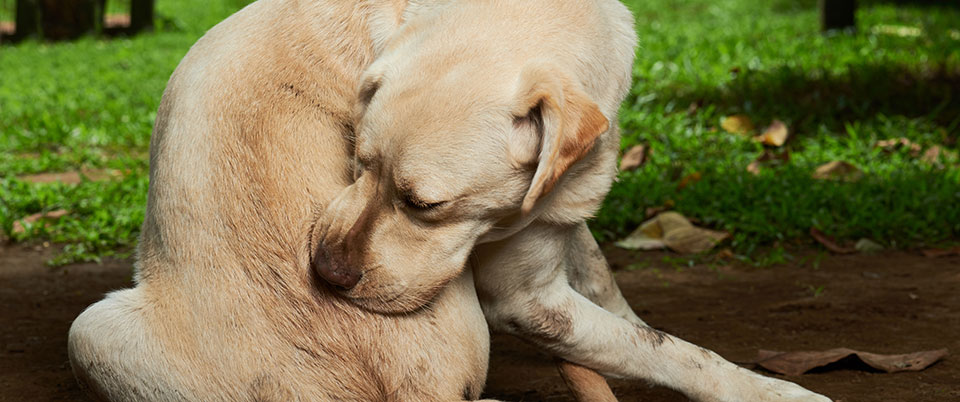 Watching your dog compulsively scratching, licking and chewing away at their skin and paws until they become red raw is distressing for any dog owner, and not knowing the cause of this behaviour or how to stop it can be even more frustrating. Here we’ll look at the possible causes of this behaviour and suggest the best steps to take to overcome these problems.
Watching your dog compulsively scratching, licking and chewing away at their skin and paws until they become red raw is distressing for any dog owner, and not knowing the cause of this behaviour or how to stop it can be even more frustrating. Here we’ll look at the possible causes of this behaviour and suggest the best steps to take to overcome these problems.
Allergies – Excessive scratching, licking and chewing is often the result of allergies to food or environmental allergens, including pollen, mould spores, house dust mites. Reactions to these allergens is known as Atopic Dermatitis, and is one of the most common causes of chronic itching in dogs. Dogs may also develop a skin irritation called contact dermatitis when they encounter substances like pesticides or soap.
Parasites – Among the most common causes for chronic licking, chewing, or scratching are fleas, ticks, and mites. Although ticks are usually visible to the naked eye, fleas often go unseen until there is a large infestation, and mites are microscopic. It’s important therefore not to assume that your dog isn’t suffering from parasites just because you can’t see them.
Boredom or anxiety – Just as people can suffer from psychological problems, so can dogs, and these can manifest themselves in scratching, licking, or chewing behaviours that can cause severe damage. Many dermatologists believe that boredom and separation anxiety are some of the leading causes of Acral Lick Granuloma.
Dry skin – A variety of factors, including winter weather, fatty acid deficiencies and over washing can cause dry skin in dogs.
Hormonal imbalances – If your dog’s body is not producing enough thyroid hormone or putting out too much cortisol, superficial skin infections can occur. You may notice bald spots, and your dog may scratch or lick as if bothered by allergies.
Pain – Your dog’s discomfort could be caused by something that is making them physically uncomfortable. For example, if you notice your dog biting his or her paw repeatedly, they could have a thorn or sharp stone stuck in his foot pad. Compulsive chewing or licking can also be a response to orthopaedic problems, including arthritis and hip dysplasia.
If you notice your dog is suffering from chronic scratching, licking, and chewing it is always best to seek the advice of a professional veterinarian to rule out anything serious and identify the underlying cause. Once the cause has been identified treatment may include:
Eliminating Parasites – If the behaviour is caused by parasites, then a flea or tick product will eliminate these and stop the discomfort caused to your dog. If fleas are causing the problem, it’s also important to ensure that your dogs bed is washed and carpets and upholstered furniture are vacuumed thoroughly to prevent re-infestation.
Changing Foods – If the behaviour is a reaction to a food allergy, then potential trigger foods should be eliminated from your dog’s diet. Common trigger foods include beef and wheat. Your dog may also require a special diet.
Medication – Your vet may prescribe medication to treat a specific cause. Soothing, anti-itch products can also be used to reduce irritation to the area and prevent further damage.
Preventing the behaviour – Because compulsive behaviours can cause serious damage and affect your dog’s quality of life, it’s important to do your best to stop your dog from chewing, licking, or scratching too much. Use a soothing anti-itch creams and shampoos to minimise discomfort. Minimising this discomfort will also work to prevent further licking and chewing, effectively helping to break to vicious circle. Collars to prevent access to irritated areas or specialist bandages and sock can also help to protect the area from further scratching, licking or biting, and give the area time to heal.
Addressing anxiety or boredom – In some cases, compulsive biting, chewing, or licking develops in response to fear, stress, or inadequate stimulation. Avoid leaving your dog home alone of extended periods of time, and be sure your dog receives plenty of exercise and stimulation. Chew toys or bones can work as an alternative stress relief and replacement for inappropriate chewing or licking behaviours.
Speak to your vet to receive a professional diagnosis and discuss the best method for relieving your dog’s irritated skin. Conventional treatments are a great place to start and can be very effective, but do seek out other, complimentary methods too and don’t forget to consider the actual cause of the problem too!
